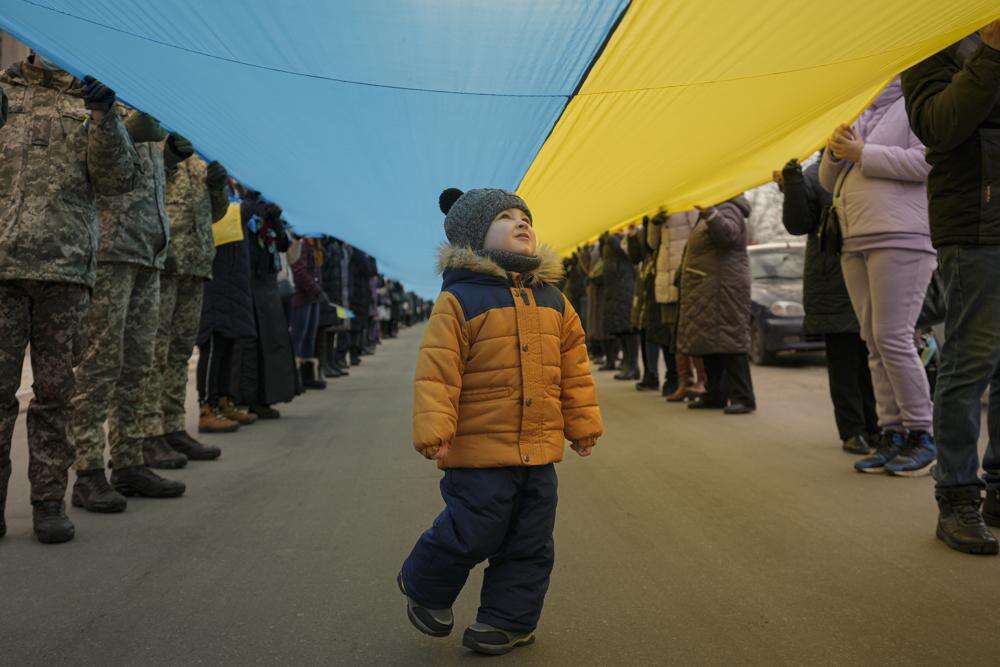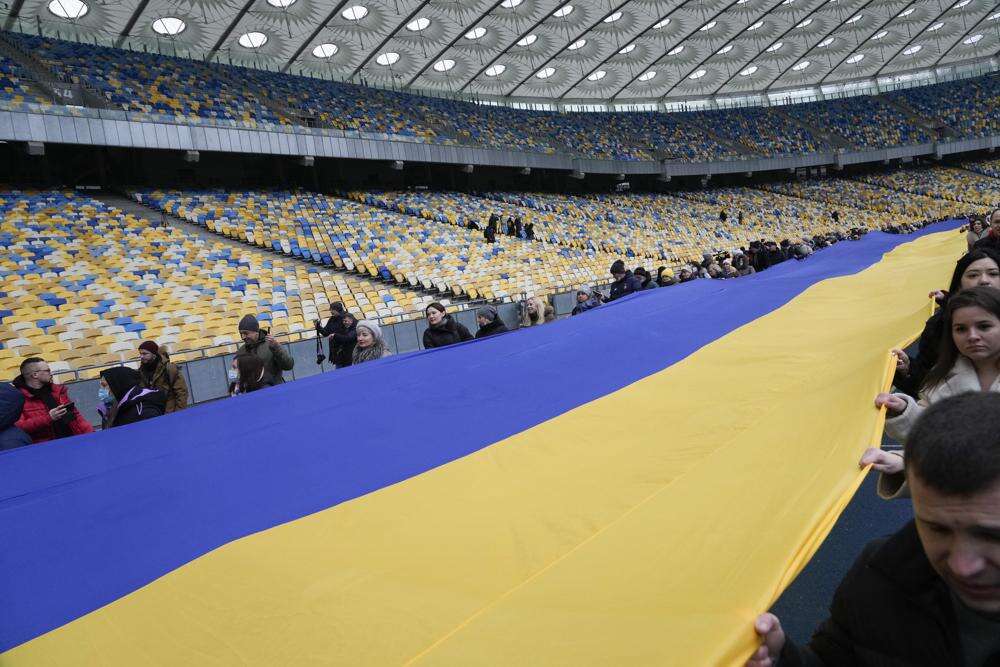Russian-backed rebels and Ukrainian forces traded accusations on Thursday that each had fired across the ceasefire line in eastern Ukraine, raising alarm at a time when Western countries have warned of the possibility of a Russian invasion any day.
Follow Israel Hayom on Facebook, Twitter, and Instagram
The details of the incidents could not be independently confirmed, and the initial reports suggested they were on a similar scale to ceasefire violations that have been common throughout the eight-year conflict.
The separatists accused government forces of opening fire on their territory four times in the past 24 hours, while Ukraine accused the rebels of firing shells, including some that struck a kindergarten, causing shell-shock to two civilians.
A Reuters photographer in the town of Kadiivka in Ukraine's rebel-held Luhansk region heard the sound of some artillery fire from the direction of the line of contact but was not immediately able to assess the details of the incident.
Kyiv and its Western allies have repeatedly said in recent weeks that they believe Moscow could use an incident in the separatist conflict as justification for an invasion. Russia, for its part, has accused Kyiv of trying to provoke an escalation to recapture rebel territory by force.
A diplomatic source said a longstanding monitoring mission from the Organization for Security and Cooperation in Europe had recorded multiple shelling incidents along the line of contact in the early hours of Thursday.
Since a 2015 ceasefire brought an end to major combat in the separatist conflict, the OSCE has typically reported dozens of ceasefire violations each day, with significant shelling or clashes leading to injuries or death several times a month.
The self-proclaimed Luhansk People's Republic, one of two rebel regions, said Ukrainian forces had used mortars, grenade launchers, and a machine gun in four separate incidents on Thursday.
"Armed forces of Ukraine have crudely violated the ceasefire regime, using heavy weapons, which, according to the Minsk agreements, should be withdrawn," the separatists said in a statement.
Referring to the rebels, Ukraine's military said: "With particular cynicism, the Russian occupation troops shelled the village of Stanytsa Lugansk in the Luhansk region. As a result of the use of heavy artillery weapons by terrorists, shells hit the kindergarten building. According to preliminary data, two civilians received shell shock."
Russia's lower house of parliament voted on Tuesday to ask President Vladimir Putin to recognize the two self-proclaimed separatist republics as independent.

On Wednesday, Ukrainians defied pressure from Moscow with a national show of flag-waving unity, while the United States warned that Russia had added as many as 7,000 troops near Ukraine's borders despite earlier Kremlin declarations that forces were being pulled back from the region.
While a Russian invasion of Ukraine did not materialize as feared, the US and its allies maintained that the threat is still strong, with Europe's security and economic stability in the balance.
Russia has amassed more than 150,000 troops east, north and south of Ukraine, according to Western estimates. Russian President Vladimir Putin has signaled that he wants a peaceful path out of the crisis, and US President Joe Biden promised that the US would continue to give diplomacy "every chance," but he struck a skeptical tone about Moscow's intentions. Biden also insisted that Washington and its allies would not "sacrifice basic principles" respecting Ukraine sovereignty.
Russian Defense Ministry video showed a trainload of armored vehicles moving across a bridge away from Crimea, the Black Sea peninsula that Russia annexed from Ukraine in 2014. It also announced that more tank units were being loaded on trains to move back to their permanent bases after training exercises.
But at the same time, Russia continued war games near Ukraine's borders and across its vast territory.
A senior US administration official said the West detected that Russia had increased its force near Ukraine by 7,000 troops, with some arriving as recently as Wednesday, and that there had been a marked increase in false claims by Russians that the Kremlin might use as pretext for an invasion.
The official said those claims included reports of unmarked graves of civilians allegedly killed by Ukrainian forces, statements that the US and Ukraine are developing biological or chemical weapons, and claims that the West is funneling in guerrillas to kill Ukrainians.
The official was not authorized to speak publicly about sensitive operations and spoke to The Associated Press on condition of anonymity. The official did not provide underlying evidence for the assertions.
The US and Europe are maintaining threats of harsh sanctions. Trust between East and West remains elusive.
"We haven't seen a pullback," US Secretary of State Antony Blinken told ABC News. "He [Putin] can pull the trigger. He can pull it today. He can pull it tomorrow. He can pull it next week. The forces are there if he wants to renew aggression against Ukraine."
State Department spokesman Ned Price said the US had seen "more Russian forces, not fewer."
Asked why Russians would claim to be withdrawing when government intelligence, commercial satellite photos and social media videos showed no evidence of that, Price said: "This is the Russian playbook, to paint a picture publicly … while they do the opposite."
NATO Secretary-General Jens Stoltenberg said the alliance also had not seen "any withdrawal of Russian forces," as did multiple European governments. Before chairing a NATO defense ministers meeting in Brussels, he said: "If they really start to withdraw forces, that's something we will welcome, but that remains to be seen."
In the meantime, the alliance is examining this week how and when to rapidly dispatch troops and equipment to countries closest to Russia and the Black Sea region should Moscow order an invasion.

Ukrainian President Volodymyr Zelenskyy similarly dismissed the Russian withdrawal claims.
"What is this? Rotations, withdrawal, returning back again," he said on a visit to the southeastern city of Mariupol. "It's too early to rejoice."
The Ukrainian leader has repeatedly sought to project calm as well as strength during the crisis, declaring Wednesday a "Day of National Unity."
"We are united by a desire to happily live in peace," Zelenskyy said in an address to the nation earlier in the day. "We can defend our home only if we stay united."
Across the country, Ukrainians of all ages waved flags in the streets and from apartment windows.
Hundreds unfolded a 200-meter (650-foot) flag at Kyiv's Olympic Stadium, while another was draped in the center of a shopping mall in the capital.
In the government-controlled part of Ukraine's eastern region of Luhansk, where Russian-backed separatists have been fighting Ukrainian troops since 2014, residents stretched another huge flag across a street.
"This event, this number of people united around Ukrainian flag will show that we stand for united Ukraine," resident Olena Tkachova said.
A 2015 deal brokered by France and Germany helped end the worst of the fighting in eastern Ukraine, but implementation has stalled. The deal, known as the Minsk agreement, would offer broad self-rule to the separatist territories and thus is resented by many in Ukraine.
A Ukrainian government official said in a television interview that Zelenskyy would consider holding a referendum on the Minsk agreement "if there are no other options or instruments." But Vice Prime Minister Iryna Vereshchuk said she was unaware that such an idea was under serious discussion.
Russia has repeatedly complained that the US and NATO have not responded satisfactorily in writing to its security concerns. Foreign Ministry spokeswoman Maria Zakharova said Wednesday that Russia is in the final phase of preparing its formal response to the West. "After that, a schedule of further steps will be developed," she said on state television.
The Kremlin wants the West to keep Ukraine and other former Soviet nations out of NATO, halt weapons deployments near Russian borders and roll back forces from Eastern Europe. The US and its allies have roundly rejected those demands, but they offered to engage in talks with Russia on ways to bolster security in Europe.
Subscribe to Israel Hayom's daily newsletter and never miss our top stories!
For now, Russia is flexing its muscle. Russian fighter jets flew training missions Wednesday over neighboring Belarus and paratroopers held shooting drills at firing ranges there as part of massive war games that the West feared could be used as cover for an invasion of Ukraine. Belarusian Foreign Minister Vladimir Makei reaffirmed that all Russian troops and weapons will leave the country when the maneuvers end Sunday.
Maxar Technologies, a commercial satellite imagery company that has been monitoring the Russian buildup, reported Wednesday that new photos show heightened Russian military activity near Ukraine, including the construction of a pontoon bridge in Belarus less than 6 kilometers (4 miles) from the Ukrainian border.
Russia has mocked Western warnings about an imminent invasion as "paranoia" and "madness." Kremlin spokesman Dmitry Peskov pointed sarcastically at warnings of an invasion that could start Wednesday, saying that Russian officials had a good sleep.
Asked by German daily Welt if Russia was going to attack Wednesday, Russia's ambassador to the European Union, Vladimir Chizhov, quipped: "Wars in Europe rarely start on a Wednesday."
"There won't be an escalation next week either, on in the week after, or in the coming month," he said.
But British Defense Secretary Ben Wallace told Sky News that instead of a Russian withdrawal, "we've seen continued buildup of things like field hospitals and strategic weapons systems."
The White House will lean on Vice President Kamala Harris to help with diplomatic efforts when she travels to Germany to take part in this weekend's Munich Security Conference, officials said. Harris is scheduled to meet Friday with Stoltenberg and hold a multilateral meeting with the leaders of the Baltic states of Latvia, Lithuania and Estonia. She's also scheduled to deliver a major address Saturday on the administration's efforts to stop Russian aggression. After the speech, Harris is slated to meet with Zelenskyy and German Chancellor Olaf Scholz.




